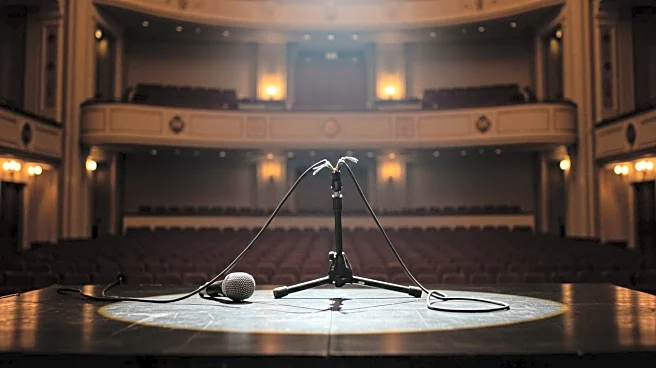What's Happening?
Ashlee Simpson recently discussed her infamous lip-syncing incident on 'Saturday Night Live' during an appearance on the Pod Meets World podcast. The incident occurred on October 23, 2004, when Simpson was performing as a musical guest. During her second song, a technical mishap led to the playback of her first song, 'Pieces of Me,' causing confusion and revealing that she was lip-syncing. Simpson explained that she had been using a vocal track due to vocal cord inflammation. Despite the backlash she faced at the time, she noted that the culture around such incidents has evolved, suggesting that the reaction might be different today. Simpson also shared that she felt the need to constantly defend her live performance abilities, even though her fans were aware of her talent. She was invited back to SNL the following season to promote her second album, indicating a level of forgiveness from the show.
Why It's Important?
The incident highlights the intense scrutiny and pressure faced by performers, particularly in the early 2000s, when media coverage was less forgiving. Simpson's experience underscores the challenges artists face in maintaining their reputations amidst public and media criticism. The evolution of celebrity culture, as noted by Simpson, suggests a shift towards a more understanding and fleeting media environment, where such incidents may not have as lasting an impact. This change reflects broader societal shifts in how public figures are perceived and treated, potentially offering more resilience and recovery opportunities for artists today. The discussion also sheds light on the personal toll such public controversies can have on individuals, influencing their careers and personal lives.
What's Next?
While the incident is now part of pop culture history, Simpson's reflections may prompt further discussions about the pressures on artists and the role of media in shaping public perception. As the entertainment industry continues to evolve, there may be increased advocacy for more supportive environments for performers. Additionally, Simpson's comments could inspire other artists to share their experiences, contributing to a broader dialogue about resilience and recovery in the face of public scrutiny.
Beyond the Headlines
Simpson's experience raises questions about the ethics of media coverage and the responsibility of platforms like SNL in handling such incidents. It also highlights the potential for growth and change within the industry, as artists and audiences alike become more aware of the human aspects behind public performances. The incident serves as a reminder of the importance of empathy and understanding in media narratives.









